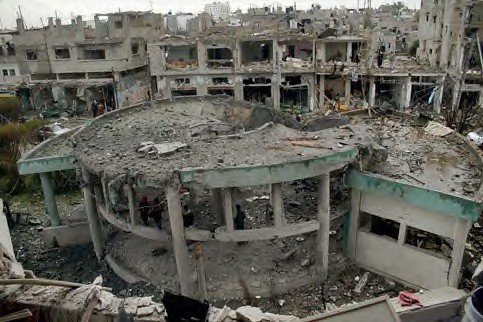
Many Gaza locations which house Palestinian refugees were attacked by the Israeli Airforce. Palestinian leader Dr. Nizar Rayyan of Hamas was killed along with his family on Thursday, January 1. Over 1400 people have been massacred by the state of Israel., a photo by Pan-African News Wire File Photos on Flickr.
Errant Syrian mortar round draws Israeli fire
Israeli troops respond to rocket attacks in Gaza
The Associated Press
Last Updated: Nov 11, 2012 1:40 PM ET
Israel was drawn into the fighting in neighbouring Syria for the first time Sunday, firing warning shots across the border after an errant mortar shell landed near an Israeli military installation in the Golan Heights.
And in another development, Israeli forces struck targets in the Gaza Strip on Sunday, killing one Palestinian and wounding more than 30 others as militants launched dozens of rockets in some of the heaviest fighting the area has seen in months.
The flare-up in Gaza increased pressure on the Israeli government to put an end to the violence, which escalated over the weekend and could turn into a major conflagration just two months before the country's general election.
Israeli leaders quickly amped up their rhetoric, warning Gaza's Islamic Hamas rulers they will pay a heavy price should they allow rocket fire toward Israel to continue.
"The world must understand that Israel will not sit idly in the face of attempts to attack us," said Israeli Prime Minister Benjamin Netanyahu. "We are prepared to intensify the response."
Potent reminder
On the border with Syria, Israel appeared eager to calm the situation, but its response to the errant mortar round was a potent reminder of how easily the Syrian civil war — already spilling across borders with Turkey, Lebanon and Jordan — could explode into a wider regional conflagration.
Israeli officials threatened even tougher retaliation if attacks persist. They have feared that the instability in Syria over the past 19 months could spill across the border into Israel, particularly as President Bashar Assad's grip on power grows increasingly weak.
Israel has little love for Assad, who has provided refuge and support to Israel's bitterest enemies through the years. But the Syrian leader — and his father before him — kept the frontier quiet for nearly four decades, providing a rare source of stability in the volatile region.
The Israeli military said the mortar fire caused no injuries or damage at the post in the Golan Heights, which Israel captured from Syria in the 1967 Mideast war and then annexed.
In recent weeks, incidents of errant fire from Syria have multiplied, leading Israel to warn that it holds Syria responsible. Israeli officials believe most of the fire has come from Syrian government forces, although they think it has been inadvertent and not been aimed at Israel.
Mortar round 'a mistake'
After responding to Sunday's mortar strike, the Israeli military moved quickly to defuse tensions.
"We understand this was a mistake and was not meant to target Israel, and then that is why we fired a warning shot in retaliation," said Lt.-Col. Avital Leibovich, a military spokeswoman. Defence officials said an anti-tank missile was fired, and there were no reports of casualties in Syria.
Defence Minister Ehud Barak said Israeli defence forces have been instructed "to prevent the battles from spilling over into our territory."
"Additional shelling into Israel from Syria will elicit a tougher response; exacting a higher price from Syria," Barak said.
Nineteen months of fighting and the mounting chaos engulfing the Assad regime have already shaken the region, spilling into Lebanon, Turkey and Jordan. In new violence Sunday, Syrian army forces backed by helicopter gunships and artillery attacked a border area with Turkey after rebels captured a crossing point, activists said.
Significant arsenals
The entry of Israel into the fighting would take the violence to a new level. Although Israel has a more powerful military, both countries have air forces and significant arsenals of tanks, missiles and other weapons. Israel is especially concerned about Syria's stockpile of chemical weapons.
An Israeli war on Syria could also draw in Syria's ally, Hezbollah, further destabilizing the region. Hezbollah, which possesses tens of thousands of rockets and missiles, battled Israel to a stalemate during a month-long war in 2006.
On Israel's southern flank, Hamas militants in the Gaza Strip, who battled Israeli forces over the weekend, might also enter the fray.
For Assad, a war with Israel could bring the end of his teetering regime. Israeli officials have said for months it is only a matter of time before he is ousted. However, officials have repeatedly warned that Assad may attack Israel in a final act of desperation if he fears his days are numbered. Israel also fears Syria could fall into the hands of Islamic extremists or descend into sectarian warfare.
Chemical weapons
Another lingering fear is that Syria's chemical weapons and missile could fall into the hands of its Lebanese ally, the Hezbollah guerrilla group, or other anti-Israel militants if Assad loses power. There are also concerns that Syria could become a staging ground for attacks by al-Qaida-linked groups battling Assad.
In a statement from his New York office, UN Secretary-General Ban Ki-moon called "for the utmost restraint" and urged Syria and Israel to uphold their cease-fire agreement.
The violence in Syria has killed more than 36,000 people in the uprising that began in March 2011. Hundreds of thousands have fled the fighting into neighbouring Turkey, Jordan, Lebanon and Iraq. Another 11,000 escaped Friday into Turkey following the surge of fighting at Ras al-Ayn.
Activists reported clashes and shelling in different parts of Syria on the weekend, killing almost 60 people, nearly two-thirds of them civilians.
No comments:
Post a Comment